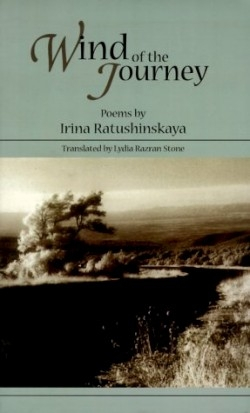Wind of the Journey
“…climb the wall, you will see quite a sight. / (though a bullet might strike your inquisitive eye as you gape.).” Written in 1984 while Ratushinskaya was in a Soviet prison camp serving a four-year sentence, these lines refer to the consequences implicit in the act of trying to understand or bear witness to truth. As many before her have stated, the crime of “not-saying” something is far worse than the crime she was prosecuted for: printing her poems in uncensored publications. Meanwhile, the poet is aware of the true offenses; those perpetrated against a people whose voice has been suppressed, and out of fear, cannot speak.
Ratushinskaya writes: “Quite some time now we’ve not lived in the world of the news, / Of Judases, and the high price of betrayal, / Where words can pierce you like knives.” She then compares her situation in prison to that of a stubborn beast who will “chew off his leg to get free. We’ll do what we must to survive-.” Russian literature has a tradition of writers risking their lives to document the struggles of the people. One tends to think of this as particular to the period surrounding the Bolshevik Revolution or the Stalin years, with Ratushinskaya, however, it is found that this is also a concern of contemporary writers.
Translated by Lydia Razran Stone, this bi-lingual edition shows the sensitivity of a scholar who aspires to bring content, as well as the sound and texture of the poems to a foreign audience. The Translator’s Note indicates that as ever, compromises were made in order to achieve the best rendering of each poem; in some cases a free-verse translation was closer to the mark, while in others it was possible to replicate much of the rhyme and meter used in the original.
Wind of the Journey contains prison poems that were written on soap, then memorized so that the “evidence” could be washed away. Other poems are the product of exile, first in the United States, then in England. The most recent poems were written in Moscow, following President Yeltsin’s restoration of her citizenship in 1998. No less moving than her earlier work, they demonstrate a preoccupation with journeys, loss, longing, and her Orthodox faith: “Once more the road, as once again day dies. / Sad fields
stretch out on either side, / With another nation’s homeland under foot. / But someone waits in silence up above / And sends us down the rain to show He’s there.“ A weariness prevails, though Ratushinskaya never falls into self-indulgent descriptions of hardship; instead, she understates this aspect, avoiding a confessional tone in favor of subtle allusions and layered stories as a means of making her point.
For anyone interested in lyrical-narrative poems from a strong woman who has endured much to bring these poems into the hands of her readers, this is an outstanding offering.
Reviewed by
Holly Wren Spaulding
Disclosure: This article is not an endorsement, but a review. The publisher of this book provided free copies of the book to have their book reviewed by a professional reviewer. No fee was paid by the publisher for this review. Foreword Reviews only recommends books that we love. Foreword Magazine, Inc. is disclosing this in accordance with the Federal Trade Commission’s 16 CFR, Part 255.

